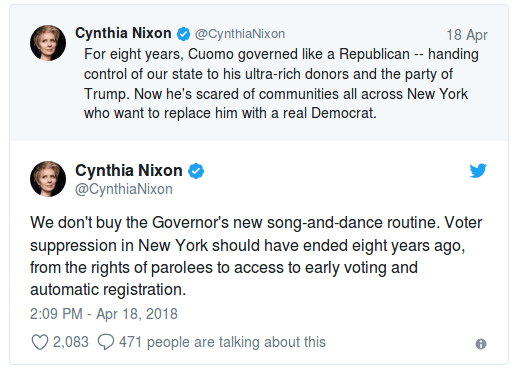New York Gov. Andrew Cuomo announced Wednesday that he was granting conditional pardons to every parolee in the state — 35,000 — to restore their voting rights.
Cuomo, facing a primary challenge from the left from actress and activist Cynthia Nixon, made an end-run around the state Legislature, where Republicans had stymied his effort.
In New York, the law bars felons on parole from voting and there are an estimated 35,000 in the state.
“I’m unwilling to take no for an answer,” he told the civil rights group National Action Network, as he ordered the state to consider conditional pardons for released felons monthly beginning in May.
Nixon said in a tweet hours after Cuomo’s announcement that their voting rights should have been restored years ago.
Felony disenfranchisement laws bar an estimated 6.1 million Americans — 2.5 percent of the nation’s voting-age population — from voting. These laws have a disproportionate affect on minorities, who are convicted of crimes at a higher rate than white Americans.
Cuomo’s office said 71 percent of the state’s parolees are minorities.
“It is unconscionable to deny voting rights to New Yorkers who have paid their debt and have re-entered society,” Cuomo said in a release.
New York joins 14 states and the District of Columbia in restoring ex-cons’ voting rights, the governor’s office said.
Twenty-one states disenfranchise voters during post-release periods like probation and parole as well, according to the National Conference of State Legislatures. A dozen disenfranchise voters even after that, too. Maine and Vermont alone do not strip felons voting rights.
A slew of states have considered changing their felony disenfranchisement laws in recent years. New Jersey Democrats are pushing forward legislation on the issue and Florida voters will consider a ballot initiative in November to automatically restore the voting rights of certain felons after they complete their sentences, including probation and parole.
In Virginia, then-Gov. Terry McAuliffe, a Democrat, started using executive orders to restore felons’ voting rights in 2016. According to the Sentencing Project, 24 states have expanded voting access for people with convictions in the last two decades.
In Texas, a woman was recently sentenced to five years in prison for voting while on supervised release; her attorney told NBC News she did not know she was breaking the law.

